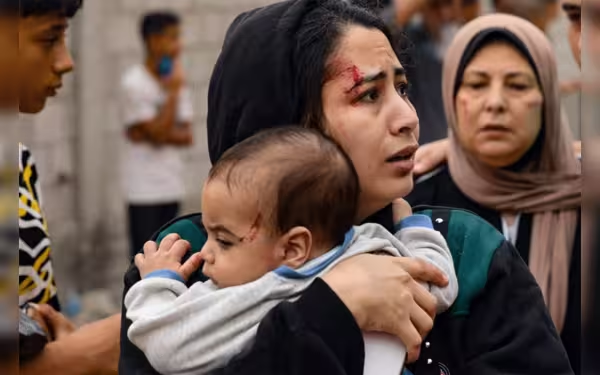Saturday, November 16, 2024 05:40 PM
Israel Intensifies Military Operations in Northern Gaza Amid Humanitarian Crisis
- Israeli tank shells strike food distribution center in Jabalia.
- Over 400,000 residents remain in northern Gaza facing dire conditions.
- UN reports alarming humanitarian crisis with over 50,000 displaced.
 Image Credits: brecorder
Image Credits: brecorderIsrael escalates military pressure in northern Gaza, leading to a humanitarian crisis with significant civilian casualties and displacement.
In recent days, the situation in northern Gaza has escalated dramatically as Israel intensifies its military operations against Hamas. This comes amid growing fears of a humanitarian crisis, with many residents facing the threat of displacement and siege. The conflict, which has been ongoing for over a year, has seen significant loss of life and widespread destruction, particularly in areas like Jabalia, where the latest attacks have resulted in numerous casualties.
On Monday, Palestinian medics reported that at least 10 individuals were killed and 30 others injured when Israeli tank shells struck a food distribution center in Jabalia. Tragically, among the casualties were women and children, highlighting the severe impact of the conflict on innocent civilians. Eyewitness accounts indicate that an Israeli drone targeted a gathering of residents who were there to receive food, further underscoring the perilous conditions in the region.
For approximately ten days, Jabalia has been at the center of an Israeli military offensive aimed at dismantling Hamas operations. The Israeli military has encircled the historic refugee camp and deployed tanks in nearby towns such as Beit Lahiya and Beit Hanoun. The stated objective is to eliminate Hamas fighters who are believed to be regrouping in these areas.
The northern part of Gaza, which is home to over half of the territory's 2.3 million residents, has endured heavy bombardment since the onset of the conflict. Many families fled their homes in the early months of the war due to Israeli evacuation orders and military ground offensives. However, estimates suggest that around 400,000 people still remain in northern Gaza, facing dire circumstances.
As the Israeli military urges Palestinians to evacuate south, Hamas has advised residents against leaving, citing the risks involved. This conflicting guidance has left many families in a state of uncertainty. Marwa, a 26-year-old resident, expressed her fears, stating, "We have been hit from the air and the ground, non-stop for a week. They want us to leave; they want to punish us for refusing to leave our homes." Such sentiments reflect the anxiety and despair felt by many in the region.
Concerns have also been raised regarding a proposal by former Israeli generals to clear northern Gaza of civilians, effectively placing the area under siege until Hamas surrenders. Military spokesman Nadav Shoshani denied the existence of such a plan, asserting that the military's focus is on protecting civilians while targeting terrorist cells in Jabalia.
Despite these assurances, the United Nations has reported alarming conditions for those remaining in Jabalia. Over 50,000 people have been displaced, and many others are trapped in their homes amid relentless bombardment. The UN's Humanitarian Coordinator, Muhannad Hadi, highlighted the closure of essential services, including water wells and medical facilities, exacerbating the humanitarian crisis.
As the conflict continues, the impact on public health is also a growing concern. The United Nations recently warned that ongoing fighting and evacuation orders could disrupt a crucial polio vaccination campaign, which is vital for protecting the health of children in the region.
The conflict between Israel and Hamas, which escalated following the October 7 attack that resulted in significant casualties on both sides, has led to a staggering loss of life. Reports indicate that more than 42,000 Palestinians have been killed since the offensive began, raising urgent questions about the future of the region and the well-being of its inhabitants.
The situation in northern Gaza remains critical, with civilians caught in the crossfire of a protracted conflict. As military operations intensify, the international community watches closely, hoping for a resolution that prioritizes the safety and dignity of all individuals affected by this devastating war. The plight of the people in Gaza serves as a stark reminder of the urgent need for peace and humanitarian assistance in the region.













